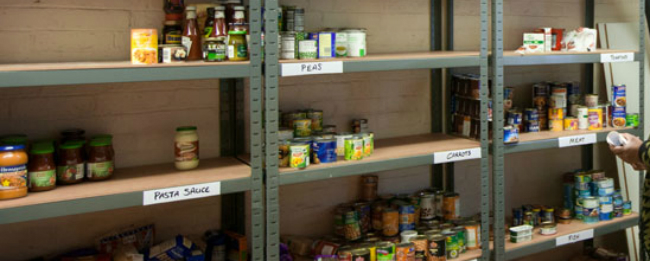Scottish Food bank provider warns against food banks becoming “new norm”
Last year food banks and food aid providers gave out more than 20 million meals to people who could not afford to feed themselves, that’s a 54 per cent increase on the previous year. This and other shocking facts came to light in new research we launched today alongside our partners at Church Action on Poverty and The Trussell Trust.
The new report – “Below the Breadline” – comes amid a dramatic rise in food bank use in Scotland with a fivefold increase reported by one provider alone. Today’s report warns that the massive rise in meals handed out is a damning indictment of an increasingly unequal Britain where 5 families have the same wealth as the poorest 20 per cent of the population. In Scotland, the richest 10% in Scotland have 900
times more wealth than the poorest 10 per cent, according to recent Scottish Government research.
Today’s report details how the recent raft of changes to the welfare system, benefit sanctions, low and stagnant wages, insecure and zero-hours contracts and rising food and energy prices are all contributing to the increasing numbers of meals handed out by food banks and other charities. Food prices have increased by 43.5 per cent in the past 8 years. During the same time the poorest 20 per cent have seen their disposable income fall by £936 a year.
It comes just a week after the Scottish Parliament’s Welfare Reform Committee identified UK-wide welfare reforms as a “significant cause” of the rising use of food banks in Scotland and highlighted sanctions as a particular issue, check out our recent blog for more information on this. Since the new sanctions policy started in
October 2012, over 1 million sanctions have been applied across the UK, with nearly 100,000 in Scotland.
Our Head of Oxfam Scotland, Jamie Livingstone, said: “Food banks provide invaluable support for families on the breadline but the fact they are needed in 21st Century Scotland, as across the UK, is a stain on our national conscience.
“At a time when politicians tell us that the economy is recovering, too many people need more help to deal with the consequences of stagnating wages, insecure work and rising food and fuel prices.
“The UK Government needs to do more to help ensure the poorest and most vulnerable people don’t bear the brunt of turning the economy around.
“No-one turns up at a food bank out of choice: it is the lack of options which forces people to use them as a measure of last resort.”
Food bank users featured in the report spoke of the struggle to feed themselves and of deteriorating health. One woman described her situation as, “like living in the 1930s and through rationing”, while another said “I wouldn’t eat for a couple of days, just drink water”. Research shows that over half a million children in the UK are living in families that are unable to provide a minimally acceptable diet.
Here’s what our partners are saying about the report:
Niall Cooper, CEO of Church Action on Poverty, said: “Protecting its people from going hungry is one of the most fundamental duties of Government. Most of us assume that when we fall on hard times, the social security safety net will kick in, and prevent us falling into destitution and hunger.
“We want all political parties to commit to re-instating the safety net principle as a core purpose of the social security system, and draw up proposals to ensure that no one in the UK should go hungry.”
Oxfam, Church Action Poverty and The Trussell Trust are calling on the UK Government to urgently draw up an action plan to reverse the rising tide of food poverty and to collect evidence to understand the scale and cause of the increases in food bank usage. They are also calling on all political parties to re-instate the social safety net principle as a core purpose of the welfare system.
Ewan Gurr, Trussell Trust’s Scotland Development Officer, said: “Among the 71,000 people Trussell Trust food banks in Scotland provided emergency food to in 2013/14, 22,387 were children.
“Creative solutions and systemic change are necessary if we are to tackle the threat of food poverty and the explosion in demand for emergency food and we endorse the recommendations offered in the ‘Below the Breadline’ report. We celebrate the way our food banks respond to need but we do not celebrate the need that demands their existence.”
Oxfam works closely with the West Dunbartonshire Community Foodshare, an independent provider with three outlets, which has reported a surge in the number of people seeking food support.
George Kirkpatrick, Chair of the Foodshare, said: “Charitable organisations like us either had to intervene and help people in need or stand aside and let people starve. That isn’t a choice.
“We hoped this would be a temporary measure but we fear this is being encouraged as the new norm for delivering welfare to the destitute.”
The report will feature on tonight’s Dispatches, to be broadcast at 7.30pm on Channel 4. The documentary, Breadline Kids, will follow four families in their daily lives as they struggle to feed themselves.
In total, Oxfam and Church Action on Poverty estimate that the three main food aid providers – Trussell Trust, Fareshare and Food Cycle – gave out over 20m meals in 2013-4, up from around 13m, a year earlier. The Trussell Trust, the only robust source of statistics showing how many people actually visit food banks, reported in April that 913,138 people were given three days’ emergency food between April 2013 and March 2014 – the equivalent of over 8 million meals. The equivalent Scottish figure is 71,428, up from just over 14,000 the previous year – a 400% increase.
